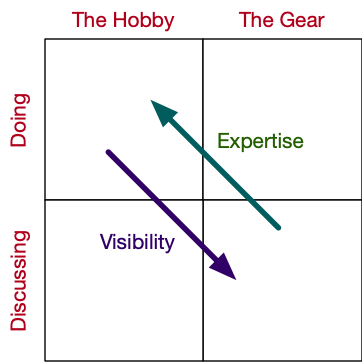Joe Van Cleave makes the interesting observation that while a hobbyist will only take a typewriter apart as much as is necessary to fix the issue at hand, the professional repair person will strip it all down and clean everything out for the coming 50 years to prevent it from coming back to them for something else in the near future thus costing more time, effort, and potential damage to their reputation.
- Jun 2024
-
www.youtube.com www.youtube.com
-
brooker.co.za brooker.co.za
-
The Four Hobbies, and Apparent Expertise by [[Marc Brooker]]

Most hobbies, sports, and areas of interest can be split into four quadrants by an individual's particular sub-interest along the lines of doing/discussing versus the activity/gear for the activity. Many people will self-select into one of the four at the expense of the other three and this can affect the type and tenor of communities around that particular activity.
Excellence in one area doesn't imply excellence in the others. "True" fanatics ought to attempt to excel in all four quadrants.
-
- Dec 2022
-
jasontucker.blog jasontucker.blog
-
I'm finding that IndieBlocks may be the way to go since most of the indieweb plugins that are out there are lacking block editor compatibility and most of them state you need classic editor enabled which isn't helpful if you are trying to move forward with the way in which WordPress is going with the block editor. Maybe some of these devs haven't "learn javascript deeply" like Matt Mullenweg suggested and are still stuck in PHP land like many of the people like me are, sadly.
Anecdotal evidence of long time WordPress fans who are being left behind in the move to Gutenberg and more JavaScript.
-
- Aug 2022
-
maggieappleton.com maggieappleton.com
-
Even though I’m an amateur researcherMeaning I do it as part of my job as a designer and writer, but in a rather a naive way compared to anyone writing a PhD., I still spend a good chunk of time hunting down and reading academic publications.
One really oughtn't downplay their research skills like this, rather they should wear them as a badge of honor. Downplaying them leeches away one's power.
Ph.D. researchers may potentially go deeper into sources, but this is only a function of time and available attention.
This sort of debate also plays out in spaces like writing computer code. The broader industry determines who is and isn't a "coder", but this is only a means of creating power structures that determine who has power and who doesn't or who is part of the conversation and who isn't.
Don't let Maggie fool you here, she is definitely part of this conversation.
What areas of work over time does this pattern of level of experience not apply to?
There is definitely a level of minimal literacy at which one could be considered a reader, but there is no distinction between amateur reader and professional reader the way there might be between an "amateur researcher" and a full time "academic researcher".
Other examples of this? Video game playing?
-